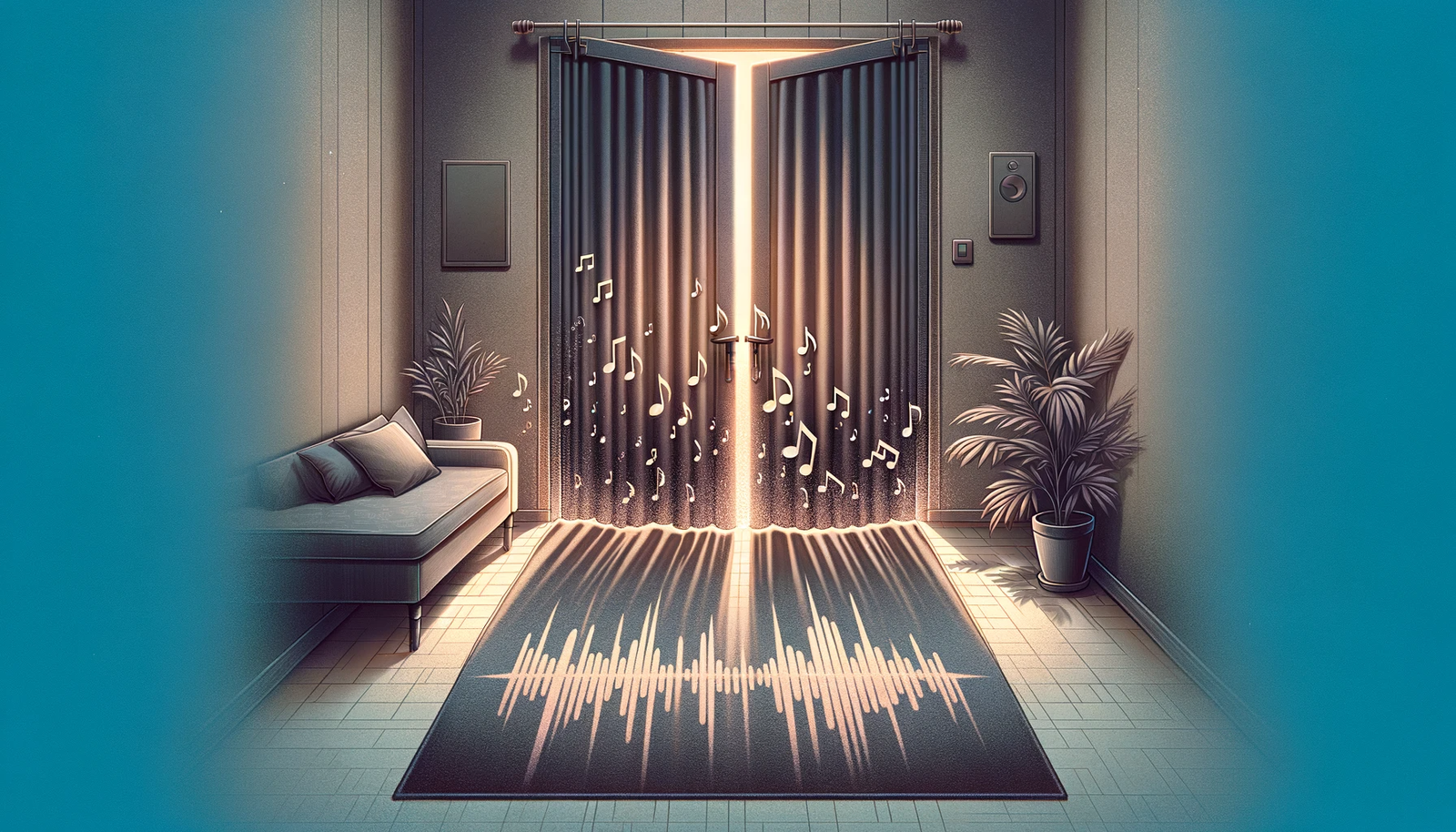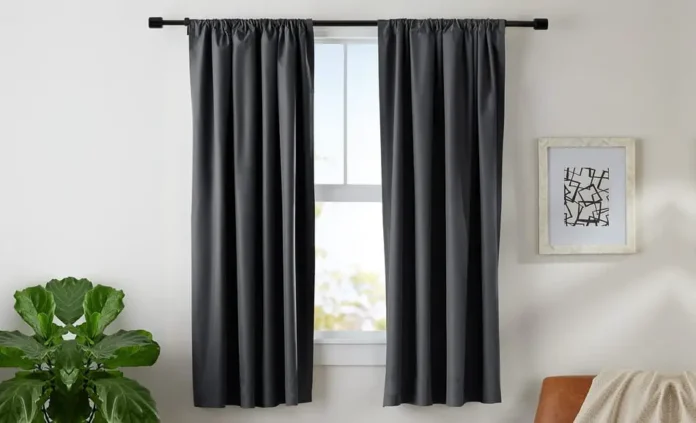Are Blackout Curtains Soundproof? In a world where tranquility and peace of mind are increasingly hard to come by, many individuals are turning to innovative solutions to create a serene environment within their homes. Two popular choices in this pursuit are blackout curtains and soundproofing materials. While each of these serves a distinct purpose, an intriguing question often arises: Can blackout curtains also double as soundproofing agents?
The Dual Purpose: Blackout Curtains and Soundproofing
At initial examination, the primary purpose of blackout curtains is to prevent light from entering and offer seclusion. The dense and layered fabrics used in blackout curtains effectively reduce light penetration, creating a darker environment that promotes better sleep and privacy. The link between these curtains and soundproofing is more complex.

Are Blackout Curtains Soundproof ?
Understanding Soundproofing
Soundproofing involves creating barriers that minimize the transmission of sound waves between spaces. Effective soundproofing materials are typically dense and thick, absorbing and dampening sound waves as they travel. Soundproofing involves minimizing sound energy by transforming it into heat energy through friction within a given material.
The Science Behind Blackout Curtains
While blackout curtains do an excellent job of blocking out light, it’s crucial to remember that their primary use is not to muffle sound. Blackout curtains have numerous layers of tightly woven or coated textiles chosen for their ability to block out light. These fabrics might offer some sound absorption due to their density, but they lack the specialized construction and thickness required for effective soundproofing.
The Soundproofing Shortfall
Advanced soundproofing requires materials with substantial mass and specific acoustic properties. While blackout curtains possess some mass, they fall short compared to purpose-built soundproofing materials such as acoustic panels, mass-loaded vinyl, or mineral wool insulation. The purpose of these specialized materials is to block the propagation of sound waves effectively. These specialized materials
Factors Affecting Blackout Curtains’ Soundproofing Ability
- Fabric Density: The denser the fabric, the better its potential to absorb sound. While blackout curtains are denser than standard curtains, they often lack the density of dedicated soundproofing materials.
- Thickness: Soundproofing requires thickness to impede sound waves. Blackout curtains might be thicker than regular curtains, but they are still thinner than materials designed exclusively for soundproofing.
- Layering: Many blackout curtains feature multiple layers for light blocking. While this can add some sound-dampening properties, it could be more effective than strategic layering in soundproofing materials.
- Sealing and Coverage: Sound can readily travel through gaps and openings. Proper soundproofing involves sealing all potential points of sound entry. While effective at blocking light, blackout curtains might not provide the airtight coverage needed for comprehensive soundproofing.
Soundproofing Capacity of Blackout Curtains
Blackout curtains possess mass, but their density might be higher for comprehensive soundproofing.
Sealing and Coverage: Soundproofing involves sealing gaps and covering potential points of sound transmission. Despite their light-blocking ability, blackout curtains might not provide the airtight coverage necessary for robust soundproofing.
Comparative Performance: Blackout curtains generally perform less than purpose-built soundproofing materials like acoustic panels, mass-loaded vinyl, and specialized insulation.
Choosing the Right Solution
For optimal soundproofing, it is advisable to utilize dedicated soundproofing materials. However, if you’re seeking a multipurpose solution that offers light control, privacy, and elemental sound absorption, blackout curtains can still contribute to a more comfortable living space.
(FAQs) Are Blackout Curtains Soundproof ?
Q1: Can blackout curtains eliminate sound?
While blackout curtains can offer a minor reduction in sound transmission due to their density, they do not eliminate sound. Purpose-built soundproofing materials are far more effective in achieving significant noise reduction.
Q2: Do double-layered blackout curtains provide better soundproofing?
Double-layered blackout curtains offer slightly improved soundproofing compared to single-layer curtains. However, the enhancement is minimal compared to materials explicitly designed for soundproofing.
Q3: Are there any recommended alternatives to blackout curtains for soundproofing?
Yes, there are various options to soundproof a room effectively. These include using acoustic panels, mass-loaded vinyl, mineral wool insulation, and heavy drapes made from sound-absorbing materials.
Q4: Can I use blackout curtains with soundproofing materials for better results?
Yes, using blackout curtains and proper soundproofing materials can yield improved results. The curtains complement the soundproofing strategy by adding a density layer and coverage.
Q5: Are there specific blackout curtains designed for soundproofing?
While some manufacturers market blackout curtains with added soundproofing qualities, it’s crucial to scrutinize their specifications and customer reviews—actual soundproofing demands particular materials and construction methods, which dual-purpose curtains may not entirely meet.
Final Verdict Are Blackout Curtains Soundproof ?
Blackout curtains possess some sound-absorbing qualities due to their density and multi-layered design. While they are not the ultimate soundproofing solution, they can provide a modest level of noise reduction. For those seeking comprehensive soundproofing, especially in noise-prone environments, opting for purpose-built materials remains the most effective choice. Adding blackout curtains to your home environment can be very helpful if you need both light control and basic sound dampening.
As with any investment, a clear understanding of your priorities and needs will guide you toward choosing a harmonious and serene living space. In pursuing a peaceful and private environment, advanced homeowners seek innovative solutions that offer darkness and sound insulation. While blackout curtains excel at providing darkness, their soundproofing capabilities vary due to differences in fabric density, thickness, and construction when compared to purpose-built soundproofing materials.
For those genuinely seeking effective soundproofing, exploring specialized options such as acoustic panels and mass-loaded vinyl remains the recommended path. Understanding the nuanced differences between these two solutions is essential to make an informed decision that aligns with one’s specific needs and aspirations for a harmonious living space

